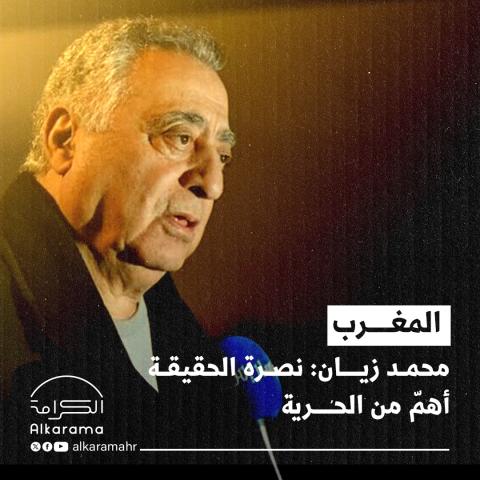
Alkarama received a report from the lawyer of Mr. Mohamed Ziane — former Minister of Human Rights, former President of the Rabat Bar Association, and founder and leader of the Moroccan Liberal Party — who has been detained for nearly 30 months in Arjate prison. The report confirms that Mr. Ziane has filed a cassation appeal against Decision No. 8 issued by the Financial Criminal Appeals Chamber of the Rabat Court of Appeal on May 7, 2025, which sentenced him to three years of effective imprisonment. His lawyer calls for his immediate release, stating that he is "a victim of injustice and has suffered severe harm."
The report adds that “filing the appeal is a legitimate step, as refraining from doing so would amount to an admission of the alleged crimes — crimes that he has continuously denied throughout the investigation, trial, and appeals, and continues to reject as described in the verdict.”
It further states that “this decision deprives him of the possibility to merge the sentences, resulting in the extension of his detention and continued incarceration for an indefinite period. He insists that the pursuit of truth is more important than freedom itself.”
In turn, Alkarama has informed the United Nations human rights mechanisms of these developments and once again called for their urgent intervention to secure Mr. Ziane’s immediate release and to put an end to the violations he is facing.
The Court of Appeal had upheld the charges against lawyer Ziane but reduced the sentence — a decision Ziane rejects, asserting that he is the victim of reprisals and violations due to his role in defending political prisoners and exposing repressive practices committed by government officials.
Alkarama’s Advocacy
Mr. Ziane was arrested on November 21, 2022, and sentenced by the Rabat Court of Appeal to three years in prison on 11 unrelated charges.
In this context, Alkarama submitted Mr. Mohamed Ziane’s case (82) to the United Nations Working Group on Arbitrary Detention (WGAD) on May 14, 2024. Previously, on February 24, 2024, Alkarama had submitted an initial communication to the UN Human Rights Committee, which subsequently called on the State party on February 28 to adopt urgent interim measures, particularly by amending the judgment.
Given the increasing violations of Mr. Ziane’s fundamental rights and the political reprisals he faces, Alkarama, on behalf of his family, also decided to present his case to the Working Group on Arbitrary Detention to seek recognition of the arbitrary nature of his deprivation of liberty.
Mr. Ziane: A Victim of Reprisals
Mr. Ziane has always been a staunch defender of fundamental rights and freedoms in his country. He has defended numerous prisoners of conscience before Moroccan courts and provided information to UN human rights mechanisms through international NGOs, including Alkarama.
In its complaints to UN special procedures, Alkarama stressed the need for the Working Group’s experts to examine all violations of Mr. Ziane’s rights and fundamental freedoms throughout all stages of domestic proceedings. His criticism of the country’s security apparatus, as a human rights defender and political opponent, has exposed him to reprisals and intimidation by state security services.
It was also noted that some of the charges against him — including those raised after his imprisonment — are closely linked to his peaceful political activities. Other charges stem from practices documented by civil society and independent UN experts, such as the use of sexual allegations by intelligence services to discredit and defame political opponents, journalists, and other peaceful activists.
Arbitrary Deprivation of Liberty Without Legal Basis
Mr. Ziane’s deprivation of liberty is considered arbitrary under international law, even if it complies with domestic legislation, if it is found to be “inappropriate, unjust, unforeseeable, unreasonable, or disproportionate, and therefore incompatible with fundamental judicial guarantees.”
In Mr. Ziane’s case, he was arrested on the same day the Rabat Court of Appeal issued its in absentia ruling — November 21, 2022 — without a referral order being read at the hearing. This fundamental omission constitutes a flagrant violation of the legal procedures outlined in Article 392 of the Moroccan Code of Criminal Procedure.
Additionally, the fact that the public prosecutor's office only delivered the detention order to Mr. Ziane’s lawyer eight days after his arrest, in an attempt to retroactively justify the detention, also constitutes a violation of the constitutional provisions of Article 23 and the requirements of the Moroccan criminal procedure law, which explicitly demand precise and transparent grounds for any deprivation of liberty.
Therefore, there is no doubt that Mr. Ziane’s arrest and detention, in disregard of legal requirements, indicate the absence of any legal basis for his imprisonment. Furthermore, the complete lack of connection between the various charges brought against him, along with the absence of a clear and detailed description of the facts supporting the conviction, underscores the political nature of the case.
Mr. Ziane was placed in pre-trial detention immediately, despite having been at liberty during his trial and posing no threat. Although detention should be the exception and for the shortest possible duration, the authorities showed no hesitation in detaining him, despite his advanced age and fragile health.
Despite the Human Rights Committee’s decision urging authorities to promptly review the ruling against him as a precautionary measure, a new detention order was issued against Mr. Ziane on March 7 of this year, based on similarly false and unfounded charges.
